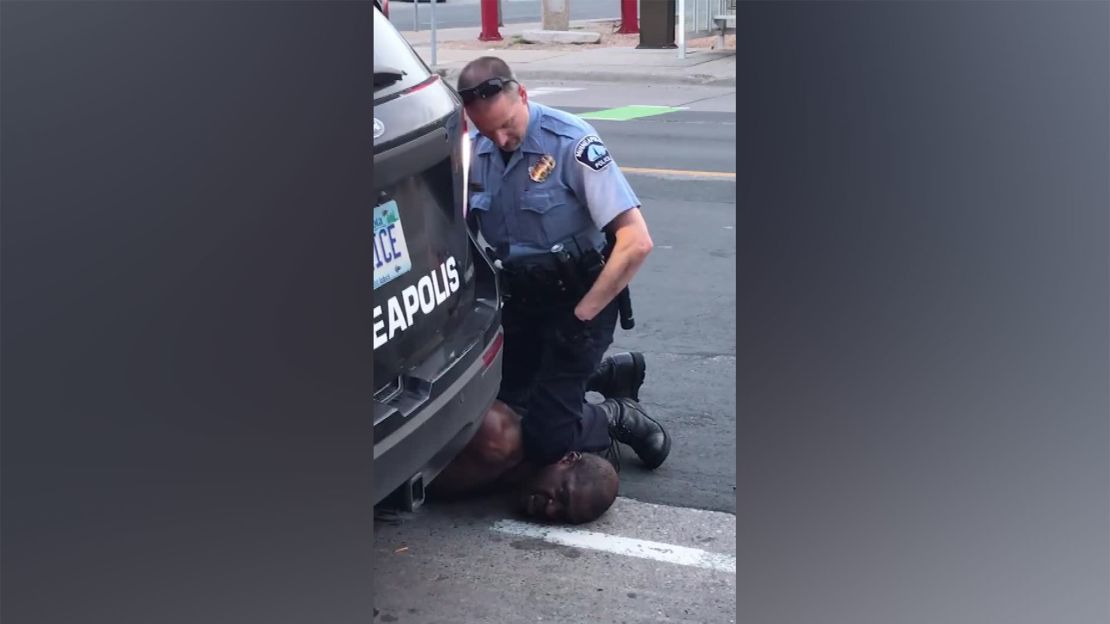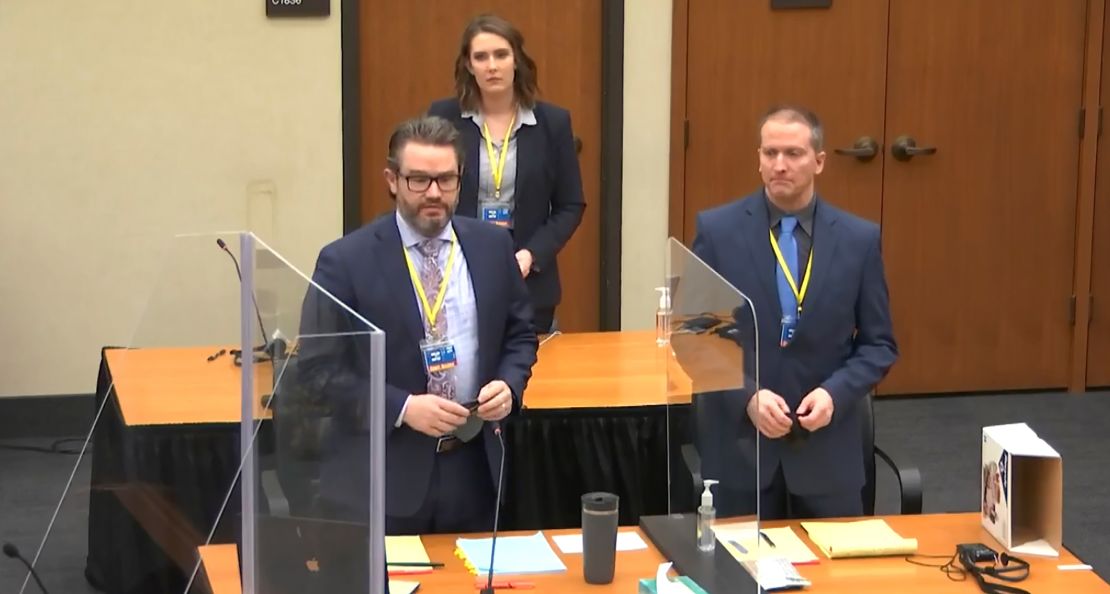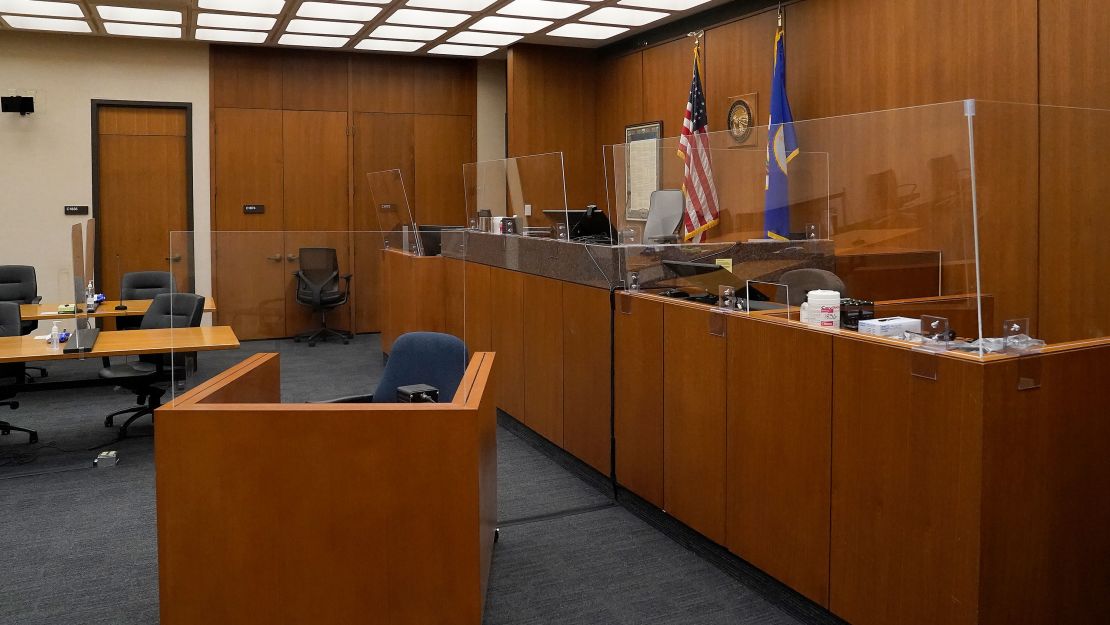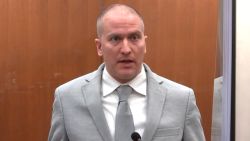George Floyd’s public death under the knee of former Minneapolis police officer Derek Chauvin last May set off an intense debate about societal issues on anti-Black racism, on police accountability and on the entire American criminal justice system.
But over the next four weeks, the debate in Chauvin’s trial inside a Hennepin County, Minnesota, courthouse will shift toward legal specifics. How exactly did Floyd die, medically speaking? How aware was Chauvin that Floyd could die? What does “culpable negligence” actually mean?
As opening statements in the trial begin Monday, the gulf between the societal issues at stake and the legal ones will be particularly wide, CNN senior legal analyst Laura Coates said.
“The ideas of excessive force generally, the ideas of police reform, the ideas of police accountability, the ideas of systemic injustice, the ideas of the treatment of Black victims at the hands of White defendants – those will all be touched upon and will be the elephants in the room, but in the courtroom none of that can overshadow the government’s burden of proof in this specific trial,” Coates said.
“Derek Chauvin is the defendant. Not the American justice system. Not all police officers.”
Chauvin has pleaded not guilty to second-degree unintentional murder, third-degree murder and second-degree manslaughter charges.
In a first for Minnesota, the trial will be broadcast live in its entirety to accommodate Covid-19 attendance restrictions, giving the public a rare peek into the most important case of the Black Lives Matter era.
Just by reaching the start of the trial, Floyd’s case has progressed further than have most deaths of Black people in police custody. Many such deaths do not lead to charges for the officers involved, including in the cases of Michael Brown, Eric Garner and Tamir Rice. Those cases that have reached a trial were not broadcast for the masses.
Perhaps the most analogous case to Floyd’s was the 2013 televised trial of George Zimmerman, the neighborhood watch volunteer charged with the murder of 17-year-old Trayvon Martin. It was Zimmerman’s acquittal in that trial that led to the start of #BlackLivesMatter as a hashtag and movement.
Now, eight years later, the return to a televised courtroom may offer a test of how much has changed since – and how much the American justice system is capable of adjusting to shifts outside the courtroom walls.
How two lives collided

Floyd, 46, was born in North Carolina and raised in Houston and moved to Minnesota as an adult for a fresh start, working as security at a restaurant.
Derek Chauvin, 45, had been an officer with the Minneapolis Police Department since 2001 until he was fired in the wake of Floyd’s death.
Their lives collided on May 25, 2020, when police were called about a man who had used a $20 counterfeit bill at a Minneapolis store. Two officers were directed to a parked car with Floyd in the driver’s seat, and they handcuffed him and moved to put him into the back of a police car, according to the amended complaint.
Chauvin and another officer then arrived to the scene and struggled to get Floyd into the vehicle, the complaint states. Chauvin allegedly pulled Floyd to the ground in a prone position and placed his knee on Floyd’s neck and head. His knee remained there even as Floyd pleaded, “I can’t breathe,” said “I’m about to die” and ultimately stopped breathing, the complaint says. He was pronounced dead at a hospital shortly after.
The final moments of Floyd’s life, captured on video by appalled and angry bystanders, illustrated in clear visuals what Black Americans have long said about the ways that the criminal justice system dehumanizes Black people.
His death sparked massive protests under the Black Lives Matter banner in cities across the country as well as incidents of looting and unrest.
“Your family is going to miss you George, but your nation is going to always remember your name,” the Rev. Al Sharpton said at Floyd’s funeral. “Because your neck was one that represents all of us, and how you suffered is how we all suffer.”
What the trial will focus on

Yet the trial will not debate Floyd’s symbolism or the merits of Black Lives Matter. Instead, it will mainly focus on two things: the cause of death and Chauvin’s intent.
The Hennepin County Medical Examiner’s autopsy listed Floyd’s cause of death as heart failure due to “law enforcement subdual, restraint, and neck compression,” and ruled it a homicide. The medical examiner, Dr. Andrew Baker, also noted Floyd’s arteriosclerotic and hypertensive heart disease, fentanyl intoxication and recent methamphetamine use as “other significant conditions.”
Chauvin’s defense attorneys have argued those other conditions were the real cause of death.
In a filing last August that previewed this defense, attorney Eric Nelson argued that Chauvin was acting within police policy and had no intent to harm Floyd. He argued that Floyd’s cause of death was not Chauvin’s knee but was the result of a drug overdose combined with preexisting heart problems, a prior Covid-19 infection and other health issues.
To get a guilty verdict, prosecutors have to prove beyond a reasonable doubt that Chauvin caused Floyd’s death. So a series of forensic pathologists are expected to take the stand to debate this issue, including a likely contentious cross-examination of Dr. Baker.
The three charges differ primarily in how they interpret Chauvin’s intent and mindset during the arrest.
The second-degree murder charge says Chauvin intentionally assaulted Floyd with his knee, which unintentionally caused Floyd’s death. The third-degree murder charge – which was added to the case in recent weeks – says Chauvin acted with a “depraved mind, without regard for human life.” And the second-degree manslaughter charge says Chauvin’s “culpable negligence” caused Floyd’s death.
Combined, the charges give jurors three different ways of deciding how liable Chauvin is for Floyd’s death – if at all– and how well he understood the risk to Floyd.
The defense has not indicated whether Chauvin will testify in his own defense. But given the importance of his mindset to the charges, he may do so to try to explain his behavior and gain the jurors’ sympathy.
“He’s almost certainly going to take the stand and say, ‘We had no idea this guy could die. We were just trying to keep him under control until the medics get there,’” said Richard Frase, Professor of Criminal Law at University of Minnesota Law School.
“He doesn’t have to convince the world that he’s innocent,” Coates said. “He has to plant a seed of reasonable doubt in the mind of one juror.”
Six men and nine women have been chosen to serve on the jury, and ultimately 12 of them will decide Chauvin’s fate.
The charges are to be considered separate, so Chauvin could be convicted of all, some or none of them. If convicted, Chauvin could face up to 40 years in prison for second-degree murder, up to 25 years for third-degree murder and up to 10 years for second-degree manslaughter.
The actual sentences would likely be much lower, though, because Chauvin has no prior convictions. Minnesota’s sentencing guidelines recommend about 12.5 years in prison for each murder charge and about four years for the manslaughter charge.
Other officers charged won’t testify

Thomas Lane, J. Alexander Kueng and Tou Thao, all former Minneapolis Police officers, were also on scene with Chauvin and are charged with aiding and abetting second-degree murder and aiding and abetting second-degree manslaughter.
They have pleaded not guilty, and their joint trial will be held this summer. They are not expected to testify in Chauvin’s trial.
Given the unrest and looting that ensued when Floyd died, local and state authorities have taken major security measures for the trial in what they are calling “Operation Safety Net.” The Hennepin County Government Center is surrounded by fencing and barricades, and the building will be empty aside from those participating in Chauvin’s trial and approved staff.
“Residents should be expecting a gradual increase in law enforcement and National Guard presence as we progress through the trial,” Minneapolis Mayor Jacob Frey said Thursday.
In addition, Covid-19 precautions have rearranged the inside of the court.
Everyone who attends the trial will be required to distance from others and wear a mask, although witnesses and attorneys may remove their masks during testimony and other court statements.Plexiglass has been installed around the courtroom as well.
Due to limits on space, only one member of Floyd’s and Chauvin’s family will be able to attend the trial each day. For all the worldwide impacts of the case, this remains at its heart a deeply personal tragedy for the Floyd family.
“We need justice because the things that my family are going through, nobody else will go through in life,” Floyd’s brother, Philonese Floyd, told CNN earlier this month. “We are torn and broken down right now.”























